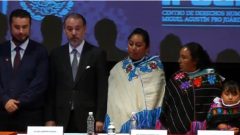
(Reuters) — Mexico’s government apologized on Tuesday (February 21) for the wrongful detention of three indigenous women for alleged kidnapping offences they did not commit.
The three women, Jacinta Francisco Maciel, Alberta Alcantara and Teresa Gonzalez were detained on the charges in 2006. Their arrest came after police cleared a market the indigenous women where they reportedly worked at.
After initial court proceedings the suspects were sentenced to 21 years in prison.
The Miguel Agustin Pro Human Rights Centre took up the case alongside Amnesty and declared that there was no evidence against the women.
“I recognize publicly their (indigenous women) in respect to the crimes that were attributed to them. They were unjustly deprived of their freedom. The federal administrative court on November 20, 2013 and as previously established by the Supreme Court, it was determined that the evidence against them were not sufficient in determining their guilt to the crimes,” admitted Attorney General Raul Cervantes.
Between 2009 and 2010 the women were released from prison after their sentences were quashed, after serving some three years of their jail time.
Alberta Alcantara said the public apology will not bring back time lost in prison.
“Mr Attorney General, I hope I am not the last, nor the first to receive a public apology. There are many people like us. I hope that your officials work well because a public apology does not make up for lost time. Thank you,” she said.
Mexico’s National Commission of Human Rights also took up the case and determined that the rights of the indigenous women were violated, with evidence fabricated and the use of false testimony.
Teresa Gonzalez said the official apology was a great victory after a decade of proclaiming her innocence.
“Our lives completely changed because we did not know what was happening. Today in these 11 years of fighting I did not have the strength to keep up the fight alongside friends and family. For me this public apology is a great victory because it brings to an end 11 years of fighting,” she said.
According to reports, the wrongfully detained women will receive compensation for their time already spent in prison.
“If you say the truth then one day it will come out. This needs to come out. At the moment we are seeing this. I will be the happy the day that injustice ends. I will be happy when we are respected and when we are respected as indigenous. Whilst this is not the case I am not happy,” said Jacinta Francisco Maciel.
According to Mexico’s National Commission for the Development of Indigenous Peoples last year, there are more than 8,000 indigenous people in jails in the country who are not aware of the charges against them due to a lack of bilingual services.
Mexico has one of the most diverse Indigenous populations in Latin America, speaking over 60 languages.







